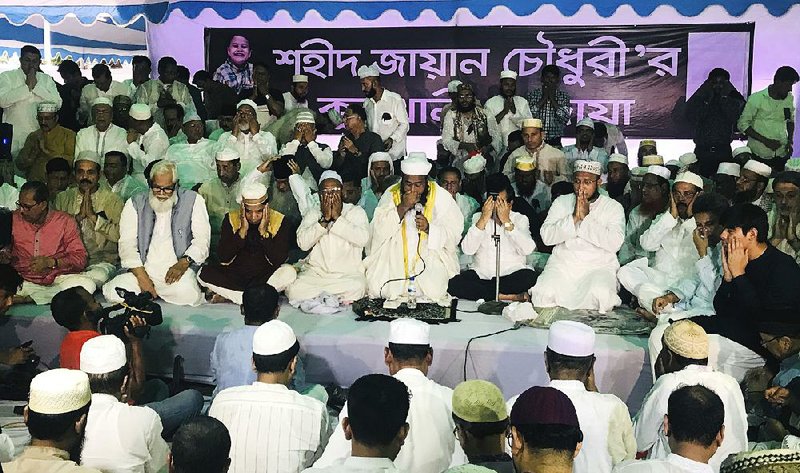MPARA, Sri Lanka -- The Sri Lankan government on Saturday formally banned two extremist groups purportedly linked to a series of Easter suicide bombings.
The office of President Maithripala Sirisena said in a statement Saturday evening that National Thowheeth Jama'ath and Jamathei Millathu Ibraheem would be banned by presidential decree. The ban allows officials to confiscate their property, presidential spokesman Dharmasri Ekanayake said.
Earlier, militants linked to the Easter bombings opened fire and set off explosives during a raid by Sri Lankan security forces on a house in the country's east, leaving behind 15 bodies, including six children.
The gunbattle began Friday night, nearly a week after the coordinated bombings of churches and luxury hotels that killed more than 250 people. There's widespread fear of more attacks as officials hunt for militants believed to still be at large.
Raids and police curfews have shut down areas of eastern Sri Lanka, and Catholic leaders have canceled Sunday Masses indefinitely. Officials also urged Muslims to stay home for prayers in an extraordinary call by the clergy to curtail worship.
The U.S. State Department, citing terror groups plotting more attacks, urged Americans to reconsider travel to Sri Lanka and ordered the school-age children of government workers to leave the country. The U.S. Embassy in Sri Lanka previously warned the public to stay away from places of worship over the weekend.
The gunfight Friday came after police tipped off soldiers about a suspected safe house near the town of Sammanthurai in Sri Lanka's Ampara District, where authorities said the militants set off three explosions and opened fire.
Police spokesman Ruwan Gunasekara said some of the dead likely were militants who blew themselves up in suicide bombings. Earlier, the military said at least one civilian had been killed.
A girl and a woman survived the explosion at the suspected safe house but were critically injured and were being treated at a hospital, Gunasekara said.
Photographs taken by The Associated Press show the remains of a child and the body of another wearing a green T-shirt with the words "good boy" written on the back. The bodies of an adult woman and man were found after the explosion.
Meanwhile, the military said security forces had recovered explosives, detonators, "suicide kits," military uniforms and Islamic State militant group flags in the ongoing raids.
Gunasekara said officers acting on information from intelligence officials also found 150 sticks of blasting gelatin and 100,000 small metal balls, as well as a van and clothing thought to have been used by those involved in the Easter attacks. Suicide bomb vests often are packed with metal balls to increase the shrapnel in the explosions, making them even deadlier.
Fear of more attacks has led to increased security at churches, shrines, temples and mosques across the multiethnic island nation of 21 million people off the southern coast of India.
Cardinal Malcolm Ranjith, the archbishop of Colombo, told reporters Friday that church officials had seen a leaked security document describing Roman Catholic churches and other denominations as a major target. He asked the faithful across Sri Lanka to stay home for their own safety.
"We don't want repetitions," Ranjith said.
It was an extraordinary request for a Catholic clergyman to make, as churches often remain a refuge. Giovanni Maria Vian, a church historian and emeritus editor of the Vatican newspaper, said he believed it was the first time the church had canceled Masses across a country for security reasons.
In Galle Face, a normally crowded oceanside park in Colombo near some of the hotels that were bombed, only a few people could be seen Saturday. Kiosks were closed and traffic was lighter than usual, with security officials blocking streets and checking vehicles at barricades.
Yashwant Kumar Singh, 23, a worker from India, said he wants to go back to his homeland because he fears another attack. "If it only happened on one day, then that wouldn't have been so difficult, but bombs are going off here every day. That is why there is an atmosphere of fear. We are feeling very scared," he said.
Meanwhile, cleaning crews worked at St. Anthony's Shrine in Colombo, the capital, where broken glass still littered a blood-stained floor, the remnants of one of the Easter attacks. They collected debris, tossing it into a truck parked outside as a heavy contingent of security forces stood guard.
Authorities told Muslims to worship at home rather than attend communal Friday prayers that are the most important religious service of the week, but several mosques held services anyway. At a mosque in Colombo, police armed with Kalashnikov assault rifles stood guard outside for hundreds of worshippers.
Sri Lanka's government, struggling after a long political crisis between the president and prime minister last year, promised swift action to capture militants still at large. Sirisena said about 140 people had been identified as having links to the Islamic State.
On Friday, police confirmed that the leader of the local militant group blamed for the attack, Mohammed Zahran, died in the suicide bombing at the Shangri-La Hotel, one of six hotels and churches attacked. Zahran appeared in an Islamic State video claiming responsibility for the coordinated assault, and authorities in both Sri Lanka and Australia confirmed links between the Islamic State and the attack.
Information for this article was contributed by Rishabh Jain, Emily Schmall and Foster Klug of The Associated Press.
A Section on 04/28/2019
